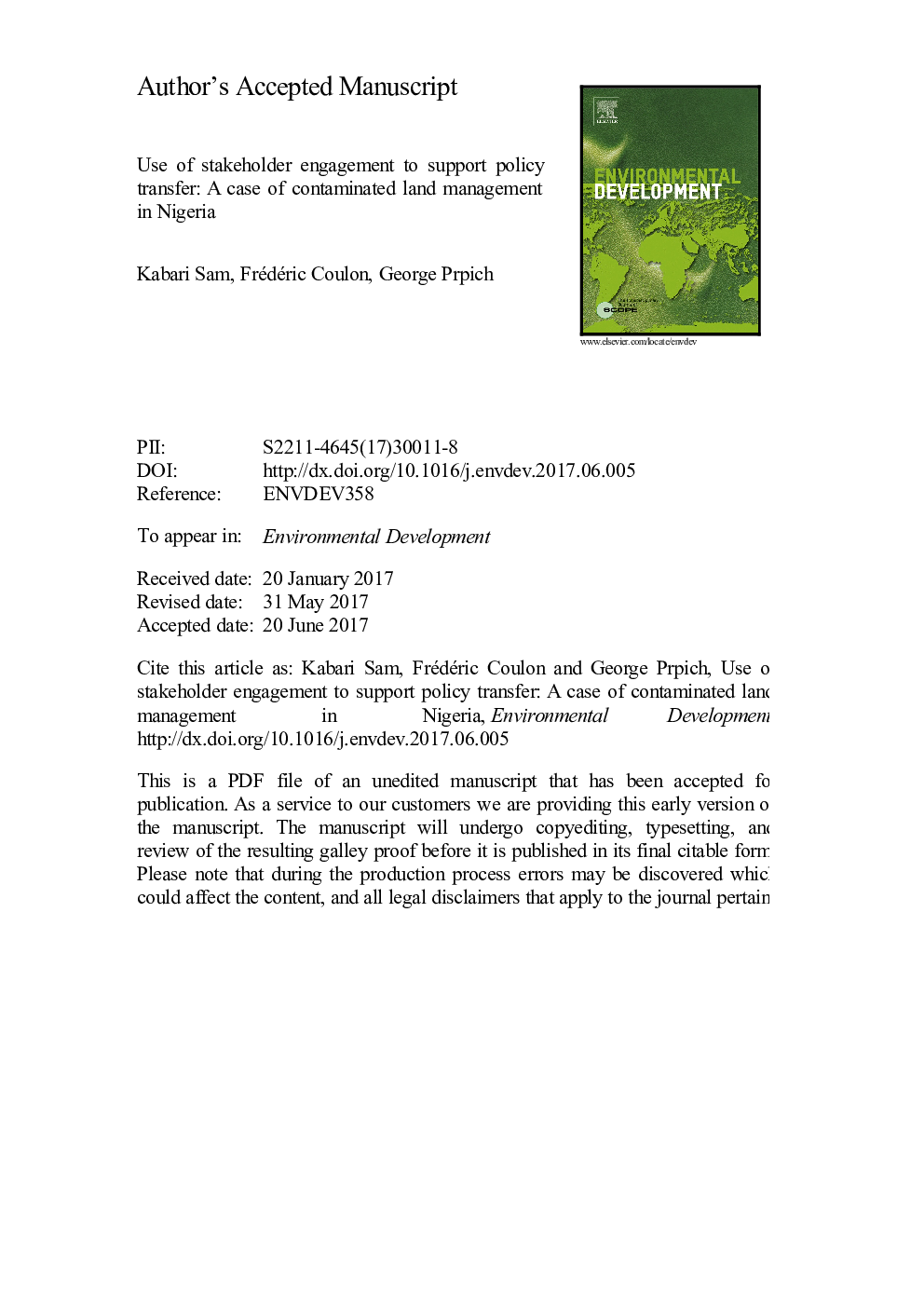| کد مقاله | کد نشریه | سال انتشار | مقاله انگلیسی | نسخه تمام متن |
|---|---|---|---|---|
| 8848309 | 1618077 | 2017 | 40 صفحه PDF | دانلود رایگان |
عنوان انگلیسی مقاله ISI
Use of stakeholder engagement to support policy transfer: A case of contaminated land management in Nigeria
ترجمه فارسی عنوان
استفاده از مشارکت ذینفعان برای حمایت از انتقال سیاست: مورد مدیریت زمین آلوده در نیجریه
دانلود مقاله + سفارش ترجمه
دانلود مقاله ISI انگلیسی
رایگان برای ایرانیان
کلمات کلیدی
زمین آلوده، ارزش های اجتماعی، انتقال سیاست، دلتا نیجر، مشارکت ذینفعان،
ترجمه چکیده
انتقال سیاست های زیست محیطی از یک کشور به کشور دیگر بدون در نظر گرفتن تفاوت های متقابل (مثلا اجتماعی و فرهنگی و اقتصادی) بین کشورها می تواند یک مانع باشد که مانع تصویب یا محدودیت اجرای و کارآیی این سیاست شود. در این مطالعه، اولویت های اجتماعی و فرهنگی ذینفعان در دلتای نیجر را بررسی می کنیم تا بدانیم که چگونه گروه های مختلف سهامدار ارزش های فرهنگی و اجتماعی را ارزشمند می دانند. ما از رویکرد مشارکت ذینفعان اصلاح شده و ترکیبی روش برای جمع آوری این اطلاعات، ترکیب کارگاه ها و مصاحبه های ذینفع استفاده کردیم. گروه های اجتماعی، رگولاتورها، کارشناسان در زمینه مدیریت آلاینده و اپراتورهای اکتشافی نفت در این مطالعه شرکت کردند و نتایج ما نشان داد که یک توافق عمومی در مورد اولویت رتبه بندی مسائل وجود دارد. مسائل مهم شامل کیفیت آب، کیفیت خاک برای کشاورزی، تولید غذا، و سلامت و سلامت انسان است. علیرغم این توافق، تفاوت در نحوه برخورد گروه های ذینفع در رتبه بندی آنها ممکن است برای سیاست گذاران چالشی باشد. دیگر موانع بالقوه برای انتقال سیاست های موثر در این تحقیق شامل تفاوت های سیاسی و فرهنگی، ساختار نظارتی و فساد می شود. به طور خلاصه، این مطالعه بینش هایی را درباره اولویت های اجتماعی و فرهنگی سهامداران دلتای نیجر ارائه می دهد؛ اطلاعاتی که توسط سیاست گذاران می تواند برای انتقال سیاست های مدیریت زمین آلوده باشد.
موضوعات مرتبط
علوم زیستی و بیوفناوری
علوم محیط زیست
بوم شناسی
چکیده انگلیسی
Transfer of environmental policy from one country to another without consideration for the contextual differences (e.g. socio-cultural, economic) between the countries can be a barrier that prevents adoption, or limits the implementation and effectiveness of that policy. In this study, we investigate the socio-cultural preferences of stakeholders in the Niger Delta to understand how different stakeholder groups value socio-cultural differences. We used a modified, mixed-methods stakeholder engagement approach to capture this information, combining stakeholder workshops and interviews. Community groups, regulators, experts in contaminated land management, and oil exploration operators participated in this study, and our results revealed a general consensus concerning the ranked priority of issues. Top issues included water quality, soil quality for agriculture, food production, and human health and wellbeing. Despite this consensus, differences in how stakeholder groups arrived at their rankings might pose a challenge for policy makers. Other potential barriers to effective policy transfer identified in this study include political and cultural differences, regulatory structure, and corruption. In sum, this study provides insights about the socio-cultural preferences of stakeholders from the Niger Delta; information that could be used by policy makers to contextualise contaminated land management policy transfer.
ناشر
Database: Elsevier - ScienceDirect (ساینس دایرکت)
Journal: Environmental Development - Volume 24, December 2017, Pages 50-62
Journal: Environmental Development - Volume 24, December 2017, Pages 50-62
نویسندگان
Kabari Sam, Frédéric Coulon, George Prpich,
